扬州市扬州中学2014届高三上学期10月月考英语试题
- 格式:doc
- 大小:732.00 KB
- 文档页数:28
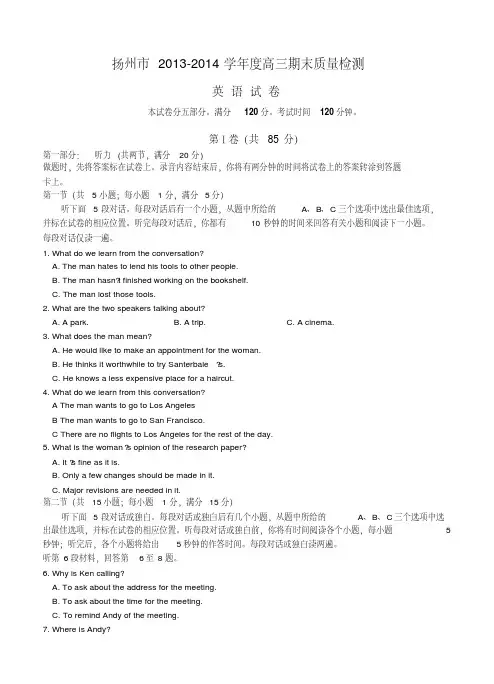
扬州市2013-2014学年度高三期末质量检测英语试卷本试卷分五部分。
满分120分。
考试时间120分钟。
第Ⅰ卷(共85 分)第一部分:听力(共两节,满分20分)做题时,先将答案标在试卷上。
录音内容结束后,你将有两分钟的时间将试卷上的答案转涂到答题卡上。
第一节(共5小题;每小题1分,满分5分)听下面5段对话。
每段对话后有一个小题,从题中所给的A、B、C三个选项中选出最佳选项,并标在试卷的相应位置。
听完每段对话后,你都有10秒钟的时间来回答有关小题和阅读下一小题。
每段对话仅读一遍。
1. What do we learn from the conversation?A. The man hates to lend his tools to other people.B. The man hasn?t finished working on the bookshelf.C. The man lost those tools.2. What are the two speakers talking about?A. A park.B. A trip.C. A cinema.3. What does the man mean?A. He would like to make an appointment for the woman.B. He thinks it worthwhile to try Santerbale?s.C. He knows a less expensive place for a haircut.4. What do we learn from this conversation?A The man wants to go to Los AngelesB The man wants to go to San Francisco.C There are no flights to Los Angeles for the rest of the day.5. What is the woman?s opinion of the research paper?A. It?s fine as it is.B. Only a few changes should be made in it.C. Major revisions are needed in it.第二节(共15小题;每小题1分,满分15分)听下面5段对话或独白。
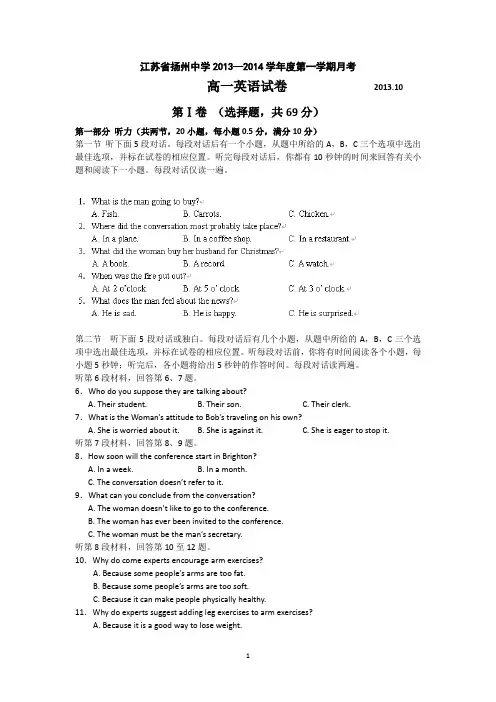
江苏省扬州中学2013—2014学年度第一学期月考高一英语试卷2013.10第Ⅰ卷(选择题,共69分)第一部分听力(共两节,20小题,每小题0.5分,满分10分)第一节听下面5段对话。
每段对话后有一个小题,从题中所给的A,B,C三个选项中选出最佳选项,并标在试卷的相应位置。
听完每段对话后,你都有10秒钟的时间来回答有关小题和阅读下一小题。
每段对话仅读一遍。
第二节听下面5段对话或独白。
每段对话后有几个小题,从题中所给的A,B,C三个选项中选出最佳选项,并标在试卷的相应位置。
听每段对话前,你将有时间阅读各个小题,每小题5秒钟;听完后,各小题将给出5秒钟的作答时间。
每段对话读两遍。
听第6段材料,回答第6、7题。
6.Who do you suppose they are talking about?A. Their student.B. Their son.C. Their clerk.7.What is the Woman’s attitude to Bob’s trave ling on his own?A. She is worried about it.B. She is against it.C. She is eager to stop it.听第7段材料,回答第8、9题。
8.How soon will the conference start in Brighton?A. In a week.B. In a month.C. The conversation doesn’t refer to it.9.What can you conclude from the conversation?A. The woman doesn’t like to go to the conference.B. The woman has ever been invited to the conference.C. The woman must be the man’s secretary.听第8段材料,回答第10至12题。
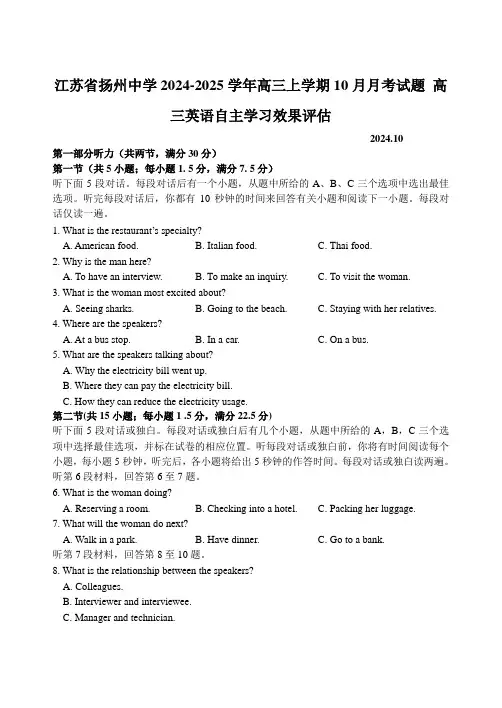
江苏省扬州中学2024-2025学年高三上学期10月月考试题高三英语自主学习效果评估2024.10第一部分听力(共两节,满分30分)第一节(共5小题;每小题1. 5分,满分7. 5分)听下面5段对话。
每段对话后有一个小题,从题中所给的A、B、C三个选项中选出最佳选项。
听完每段对话后,你都有10秒钟的时间来回答有关小题和阅读下一小题。
每段对话仅读一遍。
1. What is the restaurant’s specialty?A. American food.B. Italian food.C. Thai food.2. Why is the man here?A. To have an interview.B. To make an inquiry.C. To visit the woman.3. What is the woman most excited about?A. Seeing sharks.B. Going to the beach.C. Staying with her relatives.4. Where are the speakers?A. At a bus stop.B. In a car.C. On a bus.5. What are the speakers talking about?A. Why the electricity bill went up.B. Where they can pay the electricity bill.C. How they can reduce the electricity usage.第二节(共15小题;每小题1 .5分,满分22.5分)听下面5段对话或独白。
每段对话或独白后有几个小题,从题中所给的A,B,C三个选项中选择最佳选项,并标在试卷的相应位置。
听每段对话或独白前,你将有时间阅读每个小题,每小题5秒钟,听完后,各小题将给出5秒钟的作答时间。
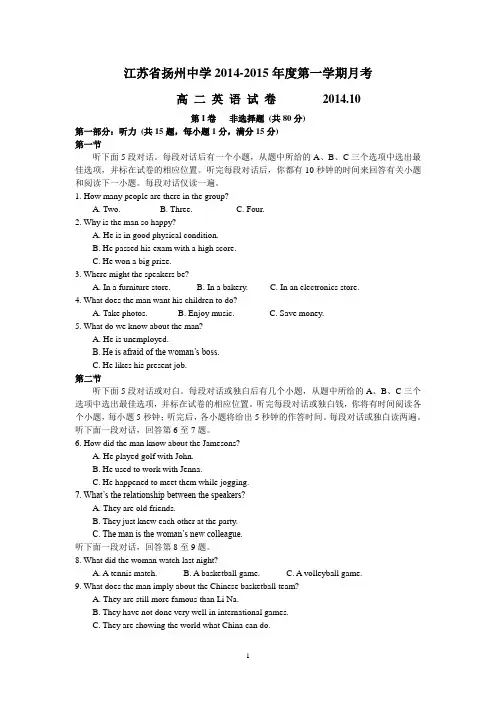
江苏省扬州中学2014-2015年度第一学期月考高二英语试卷2014.10第I卷非选择题(共80分)第一部分:听力(共15题,每小题1分,满分15分)第一节听下面5段对话。
每段对话后有一个小题,从题中所给的A、B、C三个选项中选出最佳选项,并标在试卷的相应位置。
听完每段对话后,你都有10秒钟的时间来回答有关小题和阅读下一小题。
每段对话仅读一遍。
1. How many people are there in the group?A. Two.B. Three.C. Four.2. Why is the man so happy?A. He is in good physical condition.B. He passed his exam with a high score.C. He won a big prize.3. Where might the speakers be?A. In a furniture store.B. In a bakery.C. In an electronics store.4. What does the man want his children to do?A. Take photos.B. Enjoy music.C. Save money.5. What do we know about the man?A. He is unemployed.B. He is afraid of the woman’s boss.C. He likes his present job.第二节听下面5段对话或对白。
每段对话或独白后有几个小题,从题中所给的A、B、C三个选项中选出最佳选项,并标在试卷的相应位置。
听完每段对话或独白钱,你将有时间阅读各个小题,每小题5秒钟;听完后,各小题将给出5秒钟的作答时间。
每段对话或独白读两遍。
听下面一段对话,回答第6至7题。
6. How did the man know about the Jamesons?A. He played golf with John.B. He used to work with Jenna.C. He happened to meet them while jogging.7. What’s the relationship between the speakers?A. They are old friends.B. They just knew each other at the party.C. The man is the woman’s new colleague.听下面一段对话,回答第8至9题。
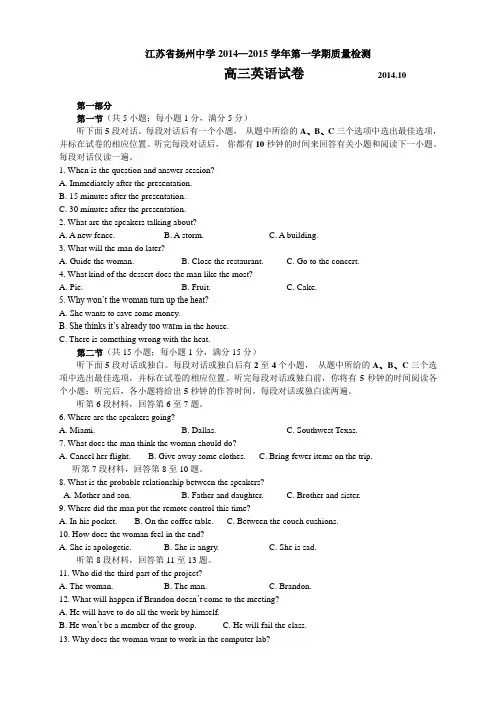
江苏省扬州中学2014—2015学年第一学期质量检测高三英语试卷2014.10第一部分第一节(共5小题;每小题1分,满分5分)听下面5段对话。
每段对话后有一个小题,从题中所给的A、B、C三个选项中选出最佳选项,并标在试卷的相应位置。
听完每段对话后,你都有10秒钟的时间来回答有关小题和阅读下一小题。
每段对话仅读一遍。
1. When is the question and answer session?A. Immediately after the presentation.B. 15 minutes after the presentation.C. 30 minutes after the presentation.2. What are the speakers talking about?A. A new fence.B. A storm.C. A building.3. What will the man do later?A. Guide the woman.B. Close the restaurant.C. Go to the concert.4. What kind of the dessert does the man like the most?A. Pie.B. Fruit.C. Cake.5. Why won’t the woman turn up the heat?A. She wants to save some money.B. She thinks it’s already too war m in the house.C. There is something wrong with the heat.第二节(共15小题;每小题1分,满分15分)听下面5段对话或独白。
每段对话或独白后有2至4个小题,从题中所给的A、B、C三个选项中选出最佳选项,并标在试卷的相应位置。
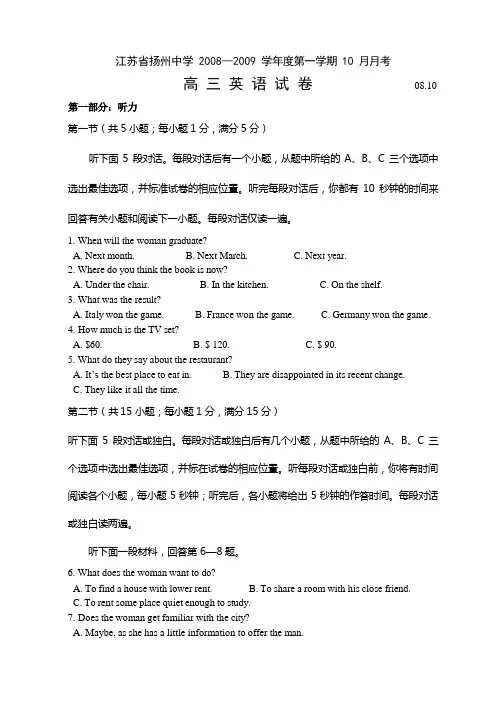
江苏省扬州中学 2008—2009 学年度第一学期 10 月月考高三英语试卷08.10 第一部分:听力第一节(共 5 小题;每小题 1 分,满分 5 分)听下面5 段对话。
每段对话后有一个小题,从题中所给的A、B、C 三个选项中选出最佳选项,并标准试卷的相应位置。
听完每段对话后,你都有10 秒钟的时间来回答有关小题和阅读下一小题。
每段对话仅读一遍。
1.When will the woman graduate?A.Next month.B. Next March.C. Next year.2.Where do you think the book is now?A.Under the chair.B. In the kitchen.C. On the shelf.3.What was the result?A.Italy won the game.B. France won the game.C. Germany won the game.4.How much is the TV set?A.$60.B. $ 120.C. $ 90.5.What do they say about the restaurant?A.It’s the best place to eat in.B. They are disappointed in its recent change.C. They like it all the time.第二节(共 15 小题;每小题 1 分,满分 15 分)听下面5 段对话或独白。
每段对话或独白后有几个小题,从题中所给的A、B、C 三个选项中选出最佳选项,并标在试卷的相应位置。
听每段对话或独白前,你将有时间阅读各个小题,每小题 5 秒钟;听完后,各小题将给出 5 秒钟的作答时间。
每段对话或独白读两遍。
听下面一段材料,回答第 6—8 题。
6.What does the woman want to do?A.To find a house with lower rent.B. To share a room with his close friend.C. To rent some place quiet enough to study.7.Does the woman get familiar with the city?A.Maybe, as she has a little information to offer the man.B.Sure, as she knows where to find what the man needs.C.Yes, as she is in charge of the affairs.8.What does the man probably do?A. A money cashier working in a supermarket.B. A student studying in a college.C. A manager arranging part time jobs.听下面一段材料,回答第 9—11 题。
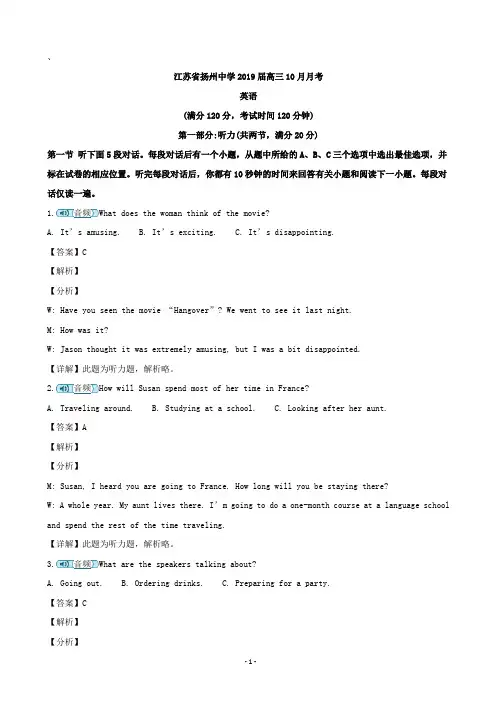
、江苏省扬州中学2019届高三10月月考英语(满分120分,考试时间120分钟)第一部分:听力(共两节,满分20分)第一节听下面5段对话。
每段对话后有一个小题,从题中所给的A、B、C三个选项中选出最佳选项,并标在试卷的相应位置。
听完每段对话后,你都有10秒钟的时间来回答有关小题和阅读下一小题。
每段对话仅读一遍。
1.音频What does the woman think of the movie?A. It’s amusing.B. It’s exciting.C. It’s disappointing.【答案】C【解析】【分析】W: Have you seen the movie “Hangover”? We went to see it last night.M: How was it?W: Jason thought it was extremely amusing, but I was a bit disappointed.【详解】此题为听力题,解析略。
2.音频How will Susan spend most of her time in France?A. Traveling around.B. Studying at a school.C. Looking after her aunt.【答案】A【解析】【分析】M: Susan, I heard you are going to France. How long will you be staying there?W: A whole year. My aunt lives there. I’m going to do a one-month course at a language school and spend the rest of the time traveling.【详解】此题为听力题,解析略。
3.音频What are the speakers talking about?A. Going out.B. Ordering drinks.C. Preparing for a party.【答案】C【解析】【分析】M: Let’s see what drinks you’ve got for the party tonig ht.W: Everything! Beer, wine, soft drinks like Coke, 7-Up…you name it, I’ve got it! Have you ordered the cake?M: Of course.【详解】此题为听力题,解析略。

绝密★启用前2013-2014学年江苏省扬州中学高三第一学期期末考试英语试卷(带解析)试卷副标题考试范围:xxx ;考试时间:85分钟;命题人:xxx学校:___________姓名:___________班级:___________考号:___________注意事项.1.答题前填写好自己的姓名、班级、考号等信息 2.请将答案正确填写在答题卡上第I 卷(选择题)一、阅读理解(题型注释)It doesn‟t kill germs better than cooler water, but turning tap temperatures high, the US burns carbon equal to the emissions of Barbados.People typically wash their hands seven times a day in the United States, but they do it at a far higher temperature than is necessary to kill germs, a new study says. The energy waste is equivalent to the fuel use of a small country.It‟s cold and flu season, when many people are concerned about avoiding germs. But forget what you think you know about hand washing, say researchers at Vanderbilt University.试卷第2页,共15页Chances are good that how you clean up is not helping you stay healthy; it is helping to make the planet sick.Amanda R. Carrico, a research assistant professor at the Vanderbilt Institute for Energy and Environment in T ennessee, told National Geographic that hand washing is often “a case where people act in ways that they think are in their best interest, but they in fact have inaccurate beliefs or outdated perceptions.”Carrico said, “It‟s certainly true that heat kills bacteria, but if you were going to use hot water to kill them it would have to be way too hot for you to tolerate.”She explained that boiling water, 212°F (99.98°C), is sometimes used to kill germs - for example, to clean drinking water that might be pol luted with germs. But “hot” water for hand washing is generally within 104°F to 131°F (40°C to 55°C.) At the high end of that range, heat could kill some germs, but the sustained contact that would be required would scald the skin. Carrico said that after a review of the scientific literature, her team found “no evidence that using hot water that a person could stand would have any benefit in killing bacteria.” Even water as cold as 40°F (4.4°C) appeared to reduce bacteria as well as hotter water, if hands were scrubbed, rinsed (冲洗)and dried properly.In fact, she noted that hot water can often have an unfavorable effect on hygiene. “Warmer water can harm the skin and affect the protective layer on the outside, which can cause it to be less resistant to bacte ria,” said Carrico.Using hot water to wash hands is therefore unnecessary, as well as wasteful, Carrico said, particularly when it comes to the environment. According to her research, people use warm or hot water 64 percent of the time when they wash thei r hands. Using that number, Carrico‟s team calculated a significant impact on the planet.“Although the choice of water temperature during a single hand wash may appear minor, when multiplied by the nearly 800 billion hand washes performed by Americans each year, this practice results in more than 6 million metric tons of CO2 equivalent emissions annually,” she said.That‟s roughly equal to the emissions of two coal -fired power plants, or 1,250,000 passenger vehicles, over the course of a year. It‟s higher than the greenhouse gas emissions of small countries like El Salvador or Armenia, and is about equivalent to the emissions of Barbados. If all US citizens washed their hands in cooler water, it would be like eliminating theenergy-related carbon emissions of 299,700 US homes, or the total annual emissions from theUS zinc or lead industries.The researchers found that close to 70 percent of respondents said they believe that using hot water is more effective than warm, room temperature, or cold water, despite a lack of evidence backing that up, said Carrico. Her study noted research that showed a “strong cognitive(认知的)connection” between water temperature and hygiene in both the United States and Western Europe, compared to other countries, like Japan, where hot water is associated more with comfort than with health.The researchers published their results in the July 2013 issue of International Journal of Consumer Studies. They recommended washing with water that is at a “comfortable” temperature, which they noted may be warmer in cold months and cooler in hot ones.1、What does the writer mainly focus on when writing this passage?A.Whether hot water helps kill germs effectively in hand washing.B.How hot water contributes to the serious worsening of our planet.C.Why the consumption of hot water is unnecessary and wasteful.D.What the advantages and disadvantages of using hot water are.2、The underlined word scald in paragraph six probably means .A.burn B.improve C.soften D.wrinkle3、According to the passage, all the following share roughly the same CO2 emissions yearly EXCEPT .A.two coal-fired power plants B.US zinc or leadindustriesC.1,250,000 passenger vehicles D.El Salvador orArmenia4、Which of the following is WRONG according to the passage?A. Boiling water at 212°F (99.98°C) works effectively in killing germs.B. Warmer water can damage the protective layer of the outside skin.C. There is much difference between cold water and hot water in reducing bacteria.D. Americans have inaccurate beliefs or outdated perceptions in hand washing.5、Which of the following is the standard of a comfortable water temperature for washing hands?A. Warmer in winter and cooler in summer.B. Between 104°F to 131°F (40°C to 55°C).C. Below 104°F (40°C) or above 131°F (55°C).试卷第4页,共15页D. Warm enough to kill germs and clean up.6、 If you want to read stories of this kind afterwards, which of the following magazines will you probably subscribe to?A .Universal Science FictionB .Science & DiscoveriesC .Environment & ProtectionD .Exploration of AmericaMy day began on a definitely sour note when I saw my six-year-old wrestling with a limb of my azalea (杜鹃花)bush. By the time I got outside, he‟d broken it. “Can I take this to school today?” he asked. With a wave of my hand, I sent him off. I turned my back so he wouldn‟t see the tears gathering in my eyes.The washing machine had leaked on my brand-new linoleum. If only my husband had just taken the time to fix it the night before when I asked him instead of playing checkers with Jonathan.It was days like this that made me want to quit. I just wanted to drive up to the mountains, hide in a cave, and never come out.Somehow I spent most of the day washing and drying clothes and thinking how love had disappeared from my life. As I finished hanging up the last of my husband‟s shirts, I looked at the clock. 2:30. I was late. Jonathan‟s class let out at 2:15 and I hurriedly drove to the school. I was out of breath by the time I knocked on the teacher‟s door and peered through the glass. She rustled through the door and took me aside. “I want to talk to you about Jonathan,” she said. I prepared myself for the worst. Nothing would have surprised me. “Did you know Jonathan brought flowers to school today?” she asked. I nodded, thinking about my favorite bush and trying to hide the hurt in my eyes. “Let me tell you about yesterday,” the teacher insisted. “See that little girl?” I watched the bright -eyed child laugh and point to a colorful picture taped to the wall. I nodded.“Well, yesterday she was almost hysterical. Her mother and father are going through a nasty divorce. She told me she didn‟t want to live, she wished she could die. I watched that little girl bury her face in her hands and say loud enough for the class to hear, …Nobody loves me.‟ I did all I could to comfort her, but it only seemed to make matters worse.” “I thought you wanted to talk to me about Jonathan,” I said.“I do,” she said, touching the sleeve of my blouse. “Today your son walked straight over to thatchild. I watched him hand her some pretty pink flowers and whisper, …I love you.‟“I felt my heart swell with pride for what my son had done. I smiled at the teacher. “Thank you,”I said, reaching for Jonathan‟s hand, “you‟ve made my day.”Later that evening, I began pulling weeds from around my azalea bush. As my mind wandered back to the love Jonathan showed the little girl, a biblical verse came to me: “...these three remain: faith, hope and love. But the greatest of these is love.” While my son had put love into practice, I had only felt anger.I heard the familiar squeak of my husband‟s brakes as he pulled into the drive. I snapped a small limb bristling with hot pink azaleas off the bush. I felt the seed of love that God planted in my family beginning to bloom once again in me. My husband‟s eyes widened in surprise as I handed him the flowers. “I love you,” I said.7、Why did the woman cry when seeing her son had broken the azalea bush? A.Because she could not tolerate the harm to it.B.Because it made her bad mood even worse.C.Because her son did not ask her for permission.D.Because she wanted to hand it to her husband.8、The writer wanted to hide in the mountain cave probably for the reason of . A.feeling fed up with her endless daily houseworkB.her husband‟s failing to fix the machine in timeC.boring daily routine with a feeling of lack of loveD.her hoping to seek happiness in a brand new place9、We can infer from the passage that the writer expressed love to her husband in that . A.she was inspired by her son that love was supposed to be felt and practicedB.she felt guilty that she misunderstood her husband and wanted to apologizeC.she felt it necessary to have a complete family for the happiness of herselfD.she wanted to prove her love and expected the same words from her husbandQ: On Facebook, my friends are a mix of real-life pals, former classmates, professional colleagues, extended-family members, and … my mom. Mom is the first to like and comment on everything I post, which is annoying. I tried talking to her about it, but her feelings quickly got hurt, so I backed off. I know I can‟t block her, but now I don‟t want to post anything. Howdo I handle this?试卷第6页,共15页A: This is about Facebook, not your mom. The often-shrugged-off truth about social media is that nothing is private. It‟s easy to forget this, so in a way, you‟re lucky that your mom is reminding you. Everything you post —comments, likes, photos —is freely available to future friends, employers, lovers etc unless blocked. That said, you can ask Mom again nicely to tone it down. You can also customize your controls so she can‟t see everything you post. Q: In which situations am I required to make a phone call versus send a text message? A: A text is for information —time, date, news. It‟s for the stuff you can keep short and sweet. A phone call is for analysis, discussion, opinion, and, if you must, gossip.Q: I‟m always on Facebook, so I just send messages to friends through the site. But when should I log off and send an e-mail?A: When you‟re serious about anything. Think of it as chatting with someone on a bus versus asking her to meet you for coffee. The former is good for casual conversation; the latter is personal and requires attention.Q: For which occasions should I mail paper invitations versus send e-mail ones? (E-cards are free and easy —what‟s not to love?!)A: Anything important needs a paper invitation. That‟s your baseline. So ask yourself: “Do I want people to dress up for this event?” If the answer is yes, dress up your invitation by making it printed instead of virtual. For more casual events and gatherings, e-card away.Q: Is using emoticons ever inappropriate to express a feeling or make a point in texts or e-mails? A: Emoticons are for fun . Is the message you‟re writing fun? Use an emoticon. Are you asking for a big favor? Skip it. Is the message to your boss or a colleague? Skip it. Avoid them if you want to be taken seriously about anything.Q: I have a big, happy announcement to share with a lot of people. Is it appropriate to share it on my blog?A: Yes, so you don‟t have to go cc -ing everyone in an e-mail. Post away. But send a private message to those who should know first.Q: I have a big, sad announcement. What should I do?A: Respect your privacy —and yourself. Pick up the phone and call a trusted friend or family member to let her know, and then ask her to help spread the news offline. 10、What do we learn about social media from the first Q and A? A .It is illegal to keep track of personal privacy on Facebook. B .Personal privacy is inaccessible online with control customized.C .People tend to ignore privacy provided it is blocked purposefully.D .We need someone to remind us constantly of our privacy online. 11、Which of the following is appropriate about using social media? A .Sending texts to consult a doctor for surgery B .Carrying on casual conversations via emails. C .Emailing your boss with emoticons for promotion. D .Writing a formal invitation for a dress-up event.12、According to the passage, how would you make it known that you have won a scholarship to Harvard?A .Arranging for a social gathering to celebrate it.B .Informing your teachers who may help you spread.C .Telling your parents before posting it on your blog.D .Sending everyone a message privately to share it.At the moment, there are two reliable ways to make electricity from sunlight. You can use a panel of solar cells to create the current directly, by liberating electrons from a semiconducting material such as silicon. Or you can concentrate the sun‟s rays using mirrors, boil water with them, and employ the steam to drive a generator.Both work. But both are expensive. Gang Chen of the Massachusetts Institute of Technology and Zhifeng Ren of Boston College therefore propose an alternative. They suggest that a phenomenon called the thermoelectric (热电)effect might be used instead —and they have built a prototype (原型)to show that the idea is practical.Thermoelectric devices are not new. They are used, for example, to capture waste heat from car engines. They work because certain materials generate an electrical potential difference within themselves if one part is hotter than another. That can be used to drive a current through an external circuit.The reason thermoelectric materials have not, in the past, been applied successfully to the试卷第8页,共15页question of solar power is that to get a worthwhile current you have to have a significant temperature difference. (200℃ is considered a good starting point.) In a car engine, that is easy. For sunlight, however, it means concentrating the heat in some way. And if you are going to the trouble of building mirrors to do that, you might as well go down the steam-generation route, which is a much more efficient way of producing electricity. If the heat concentration could be done without all the equipment of mirrors, though, thermoelectricity‟s inefficiency would be balanced by the cheapness of the equipment.In their view, three things are needed to create a workable solar-thermoelectric device. The first is to make sure that most of the sunlight which falls on it is absorbed, rather than being reflected. The second is to choose a thermoelectric material which conducts heat badly but electricity well. The third is to be certain that the temperature gradient (梯度)which that badly conducting material creates is not wasted by poor design.13、The following methods can be adopted to make electricity from sunlight EXCEPT . A .putting a panel of solar cells into use B .concentrating sun‟s rays with mirr ors C .creating a solar-thermoelectric device D .building a practical solar prototype14、Why was the application of thermoelectric materials a failure in the past? A .Because it‟s hard for them to build enough mirrors to make it work. B .Because 200℃ was hard to reach at that time even in a car engine. C .Because of the failure of having a significant temperature difference. D .Because it was hard to focus the sun‟s rays with equipment of mirrors. 15、Which of the following is the best title for this passage? A .Thermoelectric Device --- the Best Method of All B .A New Method of Making Electricity from Sunlight C .How to Create a Workable Thermoelectric Device D .Solar Power --- a New Energy Trend in the Future二、完形填空(题型注释)Even though Danish students have equal access to education, their choice of studies is still influenced by social class. Young people from working class backgrounds are by studies with a clear job profile侧面,半面,外形,轮廓and high income, prestige and studies with a strong identity interest young people of parents with university degrees when choosing which studies to . This is what researchers from the University of Copenhagen in a new study. Students who have chosen to study medicine, architecture, economy and sociology often come from homes where the parents have higher education, whereas business studies and pharmacy often young people with a working class background. This is by a research team from the University of Copenhagen and Aalborg University in a new study.“There is a between the studies chosen by young Danes and their background. Even for the young people who have very good grades in their A-level exams, and who could successfully admission to a large variety of studies, the parents‟ of education and social class play an important role in their choice,” says Education Sociologist Jens Peter Thomsen, who is one of the researchers behind the study.The study “The Educational Strategies of Danish University Students from Professional and Working-Class Backgrounds” is 60 interviews with Danish students from six different university level study programmes: Medicine, architecture, sociology, economy, pharmacy and business studies.The young people bring with them the they get from their families. If you grow up in a home with parents who are doctors or architects with a strong professional , it is an obvious choice to follow the path as your parents when you grow up.“For young people whose parents are university educated, such as fame and mastery of expert knowledge are important. They are by an educational culture in which you are a diligent student, and where leisure activities are to the identity that lies within your studies. These young people have also grown up with discussions around the dinner table which also prepare them for their lives as students,” says Jens Peter Thomsen.He also added, “Young people who come from a working class backg round, and have good grades have to the full range of opportunities they have. But the effort to reach this goal must start early”.16、A.monitored B.motivated C.motioned D.multiplied17、A.while B.although C.when D.if18、A.pursue B.engage C.involve D.conduct试卷第10页,共15页19、A .calculate B .suspect C .conclude D .achieve 20、A .required B .confirmed C .refused D .completed 21、A .subscribes to B .caters to C .sticks to D .appeals to 22、A .inquired B .proved C .extended D .acquired23、A .connection B .comparison C .difference D .contradiction 24、A .educational B .political C .social D .professional 25、A .balance B .develop C .identify D .seek 26、A .situation B .judgment C .level D .preference27、A .connected with B .based on C .committed to D .combined with 28、A .resources B .experiences C .finance D .memory 29、A .degree B .identity C .success D .responsibility 30、A .perfect B .usual C .common D .same 31、A .changes B .problems C .factors D .characters 32、A .disturbed B .moved C .puzzled D .attracted 33、A .tied B .accustomed C .transferred D .copied 34、A .practical B .topical C .physical D .medical35、A .take charge of B .take control of C .take advantage of D .take care of三、单项选择(题型注释)36、It is a common for Chinese to have banquets or drinking parties when treating important guests, on major occasions and during festivals. A .sense B .practice C .rule D .reality37、With several rounds of talks, the union leaders successfully an agreement for a shorter working week.A .deservedB .negotiatedC .persuadedD .demanded38、---Could you help me take care of my pet dog on the 19th ? --- I‟m afraid I‟m not that day.A .vacantB .sufficientC .availableD .convenient39、---My Dad began to teach me English when I was eight.---Wow. You must have studied English for six years, ?A.haven‟t you B.mustn‟t you C.needn‟t you D.don‟t you40、--With the country‟s pension fund gap becoming wider than ever, retirement age should be postponed immediately.---Easier said than done. we take all factors into account, we shall be faced with some other social problems.A.Unless B.Until C.When D.Once41、-- We had really smoggy December this year.--- I can‟t remember winter when air was polluted so severely.A.a; / B.a; the C.the; the D.a; a42、At present, there are many instances the governments distribute money to the citizens worldwide, but the sources of fund are still limited.A.how B.which C.where D.when43、--- Shall we watch Personal Tailor directed by Feng Xiaogang this weekend?--- . Isn‟t it meaningful that we do some voluntary work in the nursing house?A.How come B.Forget it C.Don‟t mention it D.Couldn‟t agree more44、On 5 December 2013, China Central Bank prohibited financial institutions from handling Bitcoin transactions, _____ to regulate the virtual currency.A.moved B.to move C.having moved D.moving45、--- Do you remember the first time you with a foreigner?--- Not really, but I remember it was in a KFC.A. talkedB. had talkedC. have talkedD. are talking46、--- Got your US visa?---Not yet. I too busy to apply for an appointment, so I didn‟t go to Shanghai l ast week?A.was B.have been C.had been D.would be47、A case of suspected food poisoning in New York has led to 6 high school students to hospital.A.being sent B.sent C.sending D.to be sent48、--The manager finally agreed to our new marketing proposals.--It never occurred to me you could succeed in persuading him to change his mind. A.which B.what C.that D.if49、—Is there anything else I can do for you, Jeff?—No. Thanks. I really appreciate ________ when you lent all your notes to me before the exam.A.one B.itC.that D.this50、---Mary knocked into a tree last night while driving, but she is all right.---She is lucky. She herself badly.A.should injure B.might injureC.should have injured D.could have injured第II卷(非选择题)四、书面表达(题型注释)51、The crowd at the airport moved forward like waves. The passengers had been waiting fora couple of hours for an airline employee to open the door leading to the plane outside. No one was in a good mood. An old man got trapped in the middle of the rush. Suddenly, he fell down, his head hitting the concrete floor, with blood gushing from his forehead. He appeared to be unconscious. Everyone rushed past him, except for Dana. She called for help.A minute later, a young airline employee showed up. Hardly looking at the old man, she told Dana to get aboard her plane. She said the old man would be okay, and walked away.Dana screamed for help. An airport supervisor appeared. He told Dana to get on the plane. Dana said that she was not moving until an ambulance arrived. The supervisor said her plane would leave without her. Dana said that she didn‟t care.An ambulance and two doctors finally arrived. The paramedics said that the man would be okay, but he would need stitches(缝线). They put him into the ambulance and drove off. On her way out to the plane, which was still refueling, Dana saw the employee who had ignored the old man. The employee said, “You‟re lucky the plane didn‟t leave without you.”“The plane?” Dana asked. “Who cares about the plane? How could you be so cold? That was an old man; he could have been your grandfather! How would you like it if everyone just stepped over your grandfather and went on their way?”【写作内容】1、以约30词概括上文的主要内容;2、以约120词谈谈你阅读了该故事后的感受,内容包括:(1) 当时在场的人是怎样的一种心理?(2) 如果你当时也在场,你将如何处理?(3) 你对整个事件作如何评价?【写作要求】1、在作文中可以使用自己亲身的经历或虚构的故事,也可以参照阅读材料的内容,但不得直接引用原文中的句子;2、作文中不能出现真实姓名和学校名称。
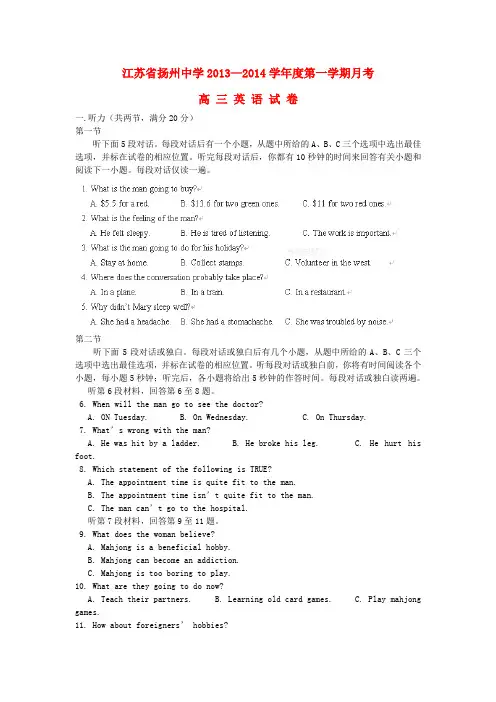
江苏省扬州中学2013—2014学年度第一学期月考高三英语试卷一.听力(共两节,满分20分)第一节听下面5段对话。
每段对话后有一个小题,从题中所给的A、B、C三个选项中选出最佳选项,并标在试卷的相应位置。
听完每段对话后,你都有10秒钟的时间来回答有关小题和阅读下一小题。
每段对话仅读一遍。
第二节听下面5段对话或独白。
每段对话或独白后有几个小题,从题中所给的A、B、C三个选项中选出最佳选项,并标在试卷的相应位置。
听每段对话或独白前,你将有时间阅读各个小题,每小题5秒钟;听完后,各小题将给出5秒钟的作答时间。
每段对话或独白读两遍。
听第6段材料,回答第6至8题。
6. When will the man go to see the doctor?A. ON Tuesday.B. On Wednesday.C. On Thursday.7. What’s wrong with the man?A. He was hit by a ladder.B. He broke his leg.C. He hurt his foot.8. Which statement of the following is TRUE?A. The appointment time is quite fit to the man.B. The appointment time isn’t quite fit to the man.C. The man can’t go to the hospital.听第7段材料,回答第9至11题。
9. What does the woman believe?A. Mahjong is a beneficial hobby.B. Mahjong can become an addiction.C. Mahjong is too boring to play.10. What are they going to do now?A. Teach their partners.B. Learning old card games.C. Play mahjong games.11. How about foreigners’ hobbies?A. Playing Mahjong only.B. Playing card games and Mahjong.C. Playing their old card games.听第8段材料,回答第12至14题。
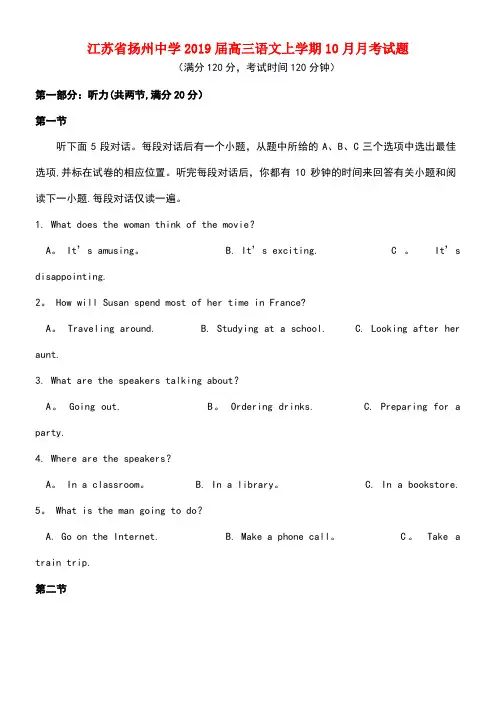
江苏省扬州中学2019届高三语文上学期10月月考试题(满分120分,考试时间120分钟)第一部分:听力(共两节,满分20分)第一节听下面5段对话。
每段对话后有一个小题,从题中所给的A、B、C三个选项中选出最佳选项,并标在试卷的相应位置。
听完每段对话后,你都有10秒钟的时间来回答有关小题和阅读下一小题.每段对话仅读一遍。
1. What does the woman think of the movie?A。
It’s amusing。
B. It’s exciting. C。
It’s disappointing.2。
How will Susan spend most of her time in France?A。
Traveling around. B. Studying at a school. C. Looking after her aunt.3. What are the speakers talking about?A。
Going out. B。
Ordering drinks. C. Preparing for a party.4. Where are the speakers?A。
In a classroom。
B. In a library。
C. In a bookstore. 5。
What is the man going to do?A. Go on the Internet.B. Make a phone call。
C。
Take a train trip.第二节听下面5段对话或独白。
每段对话或独白后有几个小题,从题中所给的A、B、C三个选项中选出最佳选项。
听每段对话或独白前,你将有时间阅读各个小题,每小题5秒钟;听完后,各小题将给出5秒钟的作答时间。
每段对话或独白读两遍。
听第6段材料,回答第6、7题.6. What is the woman looking for?A. An information office。
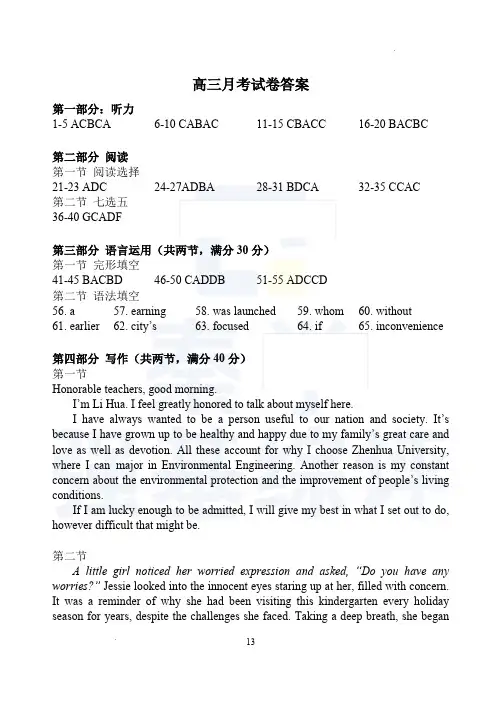
高三月考试卷答案第一部分:听力1-5 ACBCA 6-10 CABAC 11-15 CBACC 16-20 BACBC第二部分阅读第一节阅读选择21-23 ADC 24-27ADBA 28-31 BDCA 32-35 CCAC第二节七选五36-40 GCADF第三部分语言运用(共两节,满分30分)第一节完形填空41-45 BACBD 46-50 CADDB 51-55 ADCCD第二节语法填空56. a 57. earning 58. was launched 59. whom 60. without 61. earlier 62. city’s 63. focused 64. if 65. inconvenience第四部分写作(共两节,满分40分)第一节Honorable teachers, good morning.I’m Li Hua. I feel greatly honored to talk about myself here.I have always wanted to be a person useful to our nation and society. It’s because I have grown up to be healthy and happy due to my family’s great care and love as well as devotion. All these account for why I choose Zhenhua University, where I can major in Environmental Engineering. Another reason is my constant concern about the environmental protection and the improvement of people’s living conditions.If I am lucky enough to be admitted, I will give my best in what I set out to do, however difficult that might be.第二节A little girl noticed her worried expression and asked, “Do you have any worries?” Jessie looked into the innocent eyes staring up at her, filled with concern. It was a reminder of why she had been visiting this kindergarten every holiday season for years, despite the challenges she faced. Taking a deep breath, she begansharing her worries about leaving for a far- away country to pursue her studies. As she spoke, the other children gathered around, their attention captured by the conversation before them.To her surprise, the children listened attentively. Then, one by one, they started expressing their gratitude for everything she had done for them over the years. They spoke of the impact her visits had made on their lives, how her small gestures of kindness had brought them joy and hope during difficult times. The children assured Jessie that they understood her decision and would support her dreams, just as she had supported them. In that moment, Jessie realized the influence she had on these young souls, and her worries began to disappear, replaced by a sense of reassurance and love.。
江苏省扬州中学2023~2024学年高二第一学期检测英语试卷 2024.10(考试时间:120分钟满分:150分)第一部分听力(共两节,满分30分)第一节(共5小题;每小题1.5分,满分7.5分)听下面5段对话。
每段对话后有一个小题,从题中所给的A、B、C三个选项中选出最佳选项,并标在试卷的相应位置。
听完每段对话后,你都有10秒钟的时间来回答有关小题和阅读下一小题。
每段对话仅读一遍。
1. Who is the man probably talking to?A. A shop assistant.B. His wife.C. His coworker.2. What are the speakers mainly discussing?A. The woman's photo.B. A scenic spot.C. A TV drama.3. What does the man mean?A. Emerce is a doubleedged sword.B. Local specialties should be exported.C. mercials are of no use.4. What will the man do next?A. Close a window.B. Catch a mouse.C. Leave the room.5. When does the conversation take place?A. On Friday.B. On Saturday.C. On Sunday.第二节(共15小题;每小题1.5分,满分22.5分)听下面5段对话或独白。
每段对话或独白后有几个小题,从题中所给的A、B、C三个选项中选出最佳选项,并标在试卷的相应位置。
听每段对话或独白前,你将有时间阅读各个小题,每小题5秒钟;听完后,各小题将给出5秒钟的作答时间。
江苏省扬州市广陵区扬州中学2024-2025学年高三上学期10月月考英语试题一、阅读理解Best Overall: LectroFan EVO Sound MachineWhy Y ou Should Get ItThis compact, stylish, and affordable white noise machine is very easy to use. With a timer, a headphone connector, and a large range of sounds, you’ll be able to find the right set up for you. That’s where it comes in to mask all that unwanted environmental noise—or lack of—so you can get more rest.Keep in MindThe device isn’t battery-operated, so it’ll need to stay plugged into a power source.It does everything you need it to, and then some, for a very reasonable price. It plays non-repeating digital noise in a range of colors: It has 10 fan sounds, 10 environmental noise sounds—including pink and brown noise, and two ocean soundscapes.The device is super simple to use, and once you’ve picked your favorite type of noise, it will be saved in the settings, and the machine will auto play that sound each time you turn it on. The speaker produces a clear and crisp sound, and there’s a wide volume range. It also comes with an optional timer you can set between one to eight hours, or play continuously, plus a 3.5mm connector for headphones if your partner isn’t quite as keen on white noise as you are.It’s compact enough to travel everywhere with you, and as white noise machines go, it looks pretty good, too. It certainly won’t look out of place on your bedside table. You can power the LectroFan EVO via USB or the included A/C adaptor, but it doesn’t have an internal battery, so it does need to be plugged in.Price at time of publish: $35Product Details: Dimensions: It’s 4.7 inches long and 3. 3 inches in height. Its width is the same as its length. | Sound options: 22 | Timer: Yes | Power: Plug-in1.What is the device mentioned used to do?A.Avoid noises.B.Enjoy nature.C.Help sleep well.D.Listen to music. 2.What do we know about the device from the text?A.It works with batteries.B.It doesn’t disturb others.C.It has one nature noise.D.Its timer’s set up is fixed.3.How wide is the device?A.3.3 inches.B.4.7 inches.C.6. 8 inches.D.10 inches.When I was five, I once peeled off the paper that enveloped my crayons and snapped them in two. My great enthusiasm was dampened to find just more crayon inside. When I started writing words with pencils, I would twist them inside a sharpener to see if the pencil lead went all the way through the body. Growing up, I saw my television taken apart to reveal the inner workings that only made sense when I did a degree in physics.Then I landed a career in engineering, spending six years as part of the team that designed the Shard, a famous building in London. Actually, whether I knew it or not, I was already on a mission to understand how things are formed.After exploring the big, I decided to turn to the small. I realized whatever matter forms human-made objects, complex devices are made up of fundamental building blocks, without which our complex machinery wouldn’t exist.It is this idea that inspired my book where I select what I believe are seven core elements that form the basis of the world-the nail, the wheel, the spring, the magnet, the lens, the pump and the string. Together they compose a vast range of innovations in terms of their underlying (潜在的) scientific principles and the fields of engineering they touch. They’ve changed our technology, and had a sweeping impact on our history, arts, culture, communication, political and power structures, etc.The blender we use to make baby’s food relies on gears (齿轮), which couldn’t exist without the wheel. The speaker on the phone relies on a magnet. Even when we think of larger and more complex objects-diggers, skyscrapers, satellites-we come back to the same seven foundational innovations.So, look around you, and ask questions about what you see: reignite(重燃) that childhood curiosity. Hopefully, that will inspire you to investigate and lead you to a better understanding of the building blocks of our world.4.Why does the author mention crayons in paragraph 1?A.To explain his choice of college major.B.To demonstrate his fascination with tools.C.To highlight his disappointment at the discovery.D.To show his early passion for the insides of objects.5.What made the author’s book possible?A.His experience in designing buildings.B.His understanding of the origin of things.C.His finding of the components of machinery.D.His perspective on the operation of the world.6.What do we know about the seven core elements?A.They throw light on scientific principles.B.They have a profound influence on society.C.They mark an era of technological innovation.D.They represent the advancement in engineering.7.What can be the best title for the text?A.Small Things That Count B.Big Dreams That RewardC.Ask the Right Questions D.Understand Core ElementsI don’t think translation apps will make learning foreign languages completely outdated. No program can accurately recreate the implication of real conversation. For example, by dropping “will” or “am going to” in “Tomorrow I start my diet,” I am implying a previous delay of the diet. A typical translation by apps would be “Tomorrow I am going to start my diet,” which gets across the basic idea but lacks the intended implication.However, technology is eliminating the need to learn foreign languages for practical purposes such as re serving hotel rooms or ordering meals in a foreign country, since practicality is why most people want to learn a new language.Douglas Hofstadter, a cognitive scientist, sees his mastery of foreign languages as a reflection of his identity. As an enthusiastic language learner myself, I don’t entirely share his perspective, but I do agree with the writer Graeme Wood, who has noted “to actively enjoy piecing together how other languages work is an individual quirk (怪癖), not a human universal.” True enthusiasts learn new languages for the sheer joys of discovery or accomplishment. Most people, however, are uninterested in this odd desire.Some would say a foreign language is a window into a new way of processing the world. But did the humble level of French or Spanish we picked up in school provide us with a new lens on the world? If our goal is getting directions to the bus station in Rome, technology now makes that possible at the press of a button.As someone endlessly fascinated by languages, I am working hard to accept this new reality. With an iPhone handy and an appropriate app downloaded, foreign languages will no longer present most people with the barrier they once did. Learning a new language will likely become a pursuit of interest to a much smaller but more committed set of enthusiasts.8.What is paragraph 1 mainly about?A.The function of real conversation.B.The importance of accurate translation.C.The limitation of translation technology.D.The necessity of learning foreign languages. 9.Why does the author learn new languages?A.To satisfy an inner desire.B.To display his individuality.C.To serve practical purposes.D.To explore his core identity.10.What does the author think of foreign language lessons in school?A.Uninspiring.B.Irrelevant.C.Inflexible.D.Insufficient. 11.What does “this new reality” in the last paragraph refer to?A.Language enthusiasts will lose their passion.B.Foreign languages won’t pose big challenges.C.Many people will quit learning new languages.D.Learning languages is no longer a personal choice.Is forgiveness against our human nature? To answer our question, we need to ask a further question: What is the essence of our humanity? For the sake of simplicity, people consider two distinctly different views of humanity. The first view involves dominance and power. In an early paper on the psychology of forgiveness, Droll (1984) made the interesting claim that humans’ essential nature is more aggressive than forgiving allows. Those who forgive are against their basic nature, much to their harm. In his opinion, forgivers are compromising their well-being as they offer mercy to others, who might then take advantage of them.The second view involves the theme of cooperation, mutual respect, and even love as thebasis of who we are as humans. Researchers find that to fully grow as human beings, we need both to receive love from and offer love to others. Without love, our connections with a wide range of individuals in our lives can fall apart. Even common sense strongly suggests that the will to power over others does not make for harmonious interactions. For example, how well has slavery worked as a mode of social harmony?From this second viewpoint of who we are as humans, forgiveness plays a key role in the biological and psychological integrity of both individuals and communities because one of the outcomes of forgiveness, shown through scientific studies, is the decreasing of hatred and the restoration of harmony. Forgiveness can break the cycle of anger. At least to the extent the people from whom you are estranged accept your love and forgiveness and are prepared to make the required adjustments. Forgiveness can heal relationships and reconnect people.As an important note, when we take a Classical philosophical perspective, that of Aristotle, we see the distinction between potentiality and actuality. We are not necessarily born with the capacity to forgive, but instead with the potential to learn about it and to grow in our ability to forgive. The actuality of forgiving, its actual appropriation in conflict situations, develops with practice.12.What is Droll’s idea about forgiveness?A.People should offer mercy to others.B.People who forgive can have their own welfare affected.C.Forgiveness depends on the nature of humanity.D.Aggressive people should learn to forgive.13.What does the example in Paragraph 2 illustrate?A.To forgive is to love.B.To fight is to grow.C.To dominate is to harm.D.To give is to receive.14.What is the writer’s attitude toward forgiveness?A.Objective.B.Reserved.C.Favorable.D.Skeptical. 15.What is message of the last paragraph?A.Forgiveness is in our nature.B.Forgiveness grows with time.C.Actuality is based on potentiality.D.It takes practice to forgive.Sometimes, it’s good to be bored“I am dying of boredom,” complains the young wife Yelena in Chekhov’s 1897 play Uncle Vanya. Of course, if Yelena were around today, we know what she would do: pull out her smartphone and find something fun. Today it is easy to get rid of boredom. 16 That is the finding of two fascinating recent studies. In one, researchers asked subjects to do something boring, like copying out numbers from a phone book, and then take tests of creative thinkings. The result? 17 In the second study, subjects gave more answers to a word test than a non-bored control group after being forced to watch a dull screensaver.“An restless mind hungers for stimulation, so boredom becomes a seeking state,” says Sandi Mann, the psychologist at the University of Central Lancashire. “ 18 ” Parents will tell you that kids with “nothing to do” will eventually invent some fun games to play — with a cardboard box, a light switch, whatever.The problem, the researchers worry, is that these days we don’t struggle to overcome these slow moments. “ 19 ” Mann says. “This might relieve us temporarily, but it shuts down the deeper thinking.” So here is an idea: Instead of always avoiding boredom, embrace and face it. Sometimes, anyway. Mann has found she gets some of her best thinking done when she is driving her car and therefore can’t be distracted by her phone.20 The good type inspires you to see what can come of it. The bad type, in contrast, tires you and makes you feel like you can’t be bothered to do anything. An important part of our modern task, then, is learning to evaluate these different types of boredom — to distinguish the useful kind from the harmful one.A.And there is, of course, bad boredom.B.Bored subjects came up with more creative ideas.C.But what if boredom is a meaningful experience?D.These moments are a lot more valuable than expected.E.Actually, tips on getting away from boredom are countless.F.We try to kill every moment of boredom with mobile devices.G.When not satisfied with your state, you’re seeking and engaged.二、完形填空Back in the days when I was just a young student, I was always absent from school 21 , too shy to step into the public attention. My grades, though not absolutely good, was above the 22 . However, an unexpected incident allowed me to 23 life lessons and gradually accept the challenges thrown at me.One rainy afternoon, while walking home from school, an accident happened. A speeding car 24 me, leaving me with a broken leg. Lying on my hospital bed,pain aching through my body, the reality of my situation 25 . This unforeseen incident had set me back academically, and I needed to figure out how to achieve my previous 26 .With the help of my parents and teachers, who 27 accompanied me through the healing process, I managed to transform my 28 into a stepping stone. I began to acquire the will to push myself beyond my limits. After several months, I returned to school. My teachers had made accommodations for me, which included access to 29 classes to catch up on the lessons I missed. Fueled by a newfound 30 , I made every effort to engage in all activities and strived to stay active in both the academic and extracurricular fields.In the end, my actions 31 fruit. Not only did my academic performance improve, but I also developed an ability to adapt to unexpected situations. I realized the importance of being able to 32 my fears and overcome them. The incident that I 33 viewed as a major discouragement was, in fact, a turning point in my life. It was an opportunity to adjust my perspective and learn to admire the strength within myself.The 34 did not happen overnight. It was a gradual process, just like adding a new piece to a puzzle every day. But with each piece, I moved one step closer to the bigger 35 . 21.A.camps B.days C.facilities D.events 22.A.minimum B.maximum C.average D.majority 23.A.absorb B.forget C.teach D.avoid 24.A.approached B.hit C.lifted D.followed 25.A.gave in B.sank in C.fit in D.cut in 26.A.standing B.playing C.suffering D.finding 27.A.occasionally B.casually C.constantly D.scarcely28.A.shyness B.setback C.strength D.performance 29.A.practical B.optional C.basic D.extra 30.A.drive B.concept C.version D.skill 31.A.planted B.distributed C.sold D.bore 32.A.assess B.address C.monitor D.hide 33.A.initially B.actually C.suddenly D.eventually 34.A.inspiration B.assumption C.transformation D.exploration 35.A.space B.ambition C.picture D.capacity三、语法填空阅读下面材料,在空白处填入适当的内容(一个单词)或括号内单词的正确形式。
江苏省扬州中学2014届高三模拟考试英语试卷(带解析)1.________ the Hong Kong singer’s current popularity, she was largely unknown in the Chinese mainland before the talent show.A. WithB. DespiteC. BesidesD. Beyond【答案】 B【解析】试题分析:句意:虽然这个香港歌手现在很受欢迎,但是在才艺秀之前她在大陆还不为人知。
这几个词都是介词,意思是:A. With随着,B. Despite 虽然,C. Besides除了,D. Beyond 超过,所以选B。
考点:考查介词辨析2.—The two people speak different languages and can not communicate with each other well.—Oh,I see. That’s ________ misunderstanding occurs.A.when B.what C.which D.why【答案】 D【解析】试题分析:句意:--这两个人说不同的语言,不能彼此很好的交流。
--哦,我明白,这就是误解产生的地方原因。
这里is后面是表语从句,表语从句中不缺少主宾表,用why连接表语从句。
That is why….那就是….的原因,选D。
考点:考查表语从句的连接词3.Besides proper diet, exercise is one of the key ___________of a healthy lifestyle.A. componentsB. categoriesC. rangesD. processes 【答案】 A【解析】试题分析:句意:除了适当的饮食,锻炼是健康的生活方式的一个重要的组成部分。
四个选项的含义分别是:A. Components组成部分,B. Categories目录,C. Ranges范围,射程,D. Processes过程,所以选A。
江苏省扬州中学2024-2025学年度第一学期10月考试题高三政治2024.10注意事项:1.作答前,请将自己的姓名、考试证号等写在答题卡上并贴上条形码。
2.将选择题答案填涂在答题卡的指定位置上,非选择题一律在答题卡上作答,在试卷上答题无效。
3.考试结束后,请将答题卡交监考人员。
第I卷(选择题共48分)一、单项选择题:本大题共16小题,每小题3分,共48分。
在每题给出的四个选项中,只有一项是最符合题意的。
1.2024年7月26日,国务院国资委财管运行局负责人表示,未来五年,中央企业预计安排大规模设备更新改造总投资超3万亿元。
国资委将加大出资人政策支持力度,指导中央企业在本轮大规模设备更新中发挥表率引领作用。
同时,要求中央企业在采购设备时对各类企业一视同仁,让质价双优的装备供应商脱颖而出。
这将有利于①推动技术变革和产业升级②促进废旧装备再造利用,发展循环经济③撬动投资,发挥其对拉动经济增长的关键性作用④实现公有制和非公有制经济在国民经济中的地位平等A.①② B.①③ C.②④ D.③④2.算力券是政府免费发放给企业的一种创新型消费券。
2024年以来,全国不少地方以发放算力券的方式,帮助某些有需要的中小微企业解决算力使用难题,倡导和鼓励更多的企业加强算力投入,推动算力及人工智能产业发展。
政府发放算力券①能促进算力市场供需关系有效对接②将增加中小微企业的算力成本投入③是数据要素市场化配置改革的表现④能促进中小微企业发展动能的转变A.①③ B.①④ C.②③ D.②④3.2024年6月,国家卫生健康委等多部门联合发布的《关于进一步健全机制推动城市医疗资源向县级医院和城乡基层下沉的通知》提出,要深化城市医院支援县级医院工作,组织城市医院支援社区卫生服务中心,部署县级以上医院支援乡镇卫生院和村卫生室。
此举能够A.扩大基本医疗保障范围,促进城乡医疗资源均衡发展B.推动紧密型县域医共体建设,提高医疗资源配置效率C.促进城乡医院、卫生院合并,满足人民群众就医需求D.引导优质医疗资源下沉基层,建立健全社会保障制度4.ESG关注企业的环保责任(Environmental)、社会责任(Social)、治理绩效(Governance),而非单一的财务绩效,已成为世界各国日益重视的投资新理念。
江苏省扬州中学2024-2025学年高三上学期10月月考语文试卷一、现代文阅读(35分)(一)现代文阅读I(本题共5小题,19分)1.(19分)阅读下面的文字,完成下列各题。
什么是龙,确乎是一个谜。
龙像马,所以马往往被呼为龙。
《月令》“驾苍龙”,《周礼•庾人》“马八尺以上为龙”,皆其例。
龙有时又像狗。
《后汉书•孔僖传》“画龙不成反类狗”,所以狗也被呼为龙。
此外还有一种有鳞的龙像鱼,一种有翼的又像鸟,一种有角的又像鹿。
至于与龙最容易相混的各种爬虫类的生物,更不必列举了。
然则龙究竟是个什么东西呢?我们的答案是:它是一种图腾(Totem),并且是只存在于图腾中而不存在于生物界中的一种虚拟的生物,因为它是由许多不同的图腾糅合成的一种综合体。
因部落的兼并而产生的混合的图腾,古埃及是一个最显著的例。
在我们历史上,五方兽中的北方玄武本是龟蛇二兽,也是一个好例。
不同的是,这些是几个图腾单位并存着,各单位的个别形态依然未变,而龙则是许多单位经过融化作用,形成了一个新的大单位,其各小单位已经是不复个别的存在罢了。
前者可称为混合式的图腾,后者化合式的图腾。
部落既总是强的兼并弱的,大的兼并小的,所以在混合式的图腾中总有一种主要的生物或无生物,作为它的基本的中心单位,同样的在化合式的图腾中,也必然是以一种生物或无生物的形态为其主干,而以其他若干生物或无生物的形态为附加部分。
龙图腾,不拘它局部的像马也好,像狗也好,或像鱼,像鸟,像鹿都好,它的主干部分和基本形态却是蛇。
这表明在当初那众图腾单位林立的时代,内中以蛇图腾为最强大,众图腾的合并与融化,便是这蛇图腾兼并与同化了许多弱小单位的结果。
金文龙字的偏旁皆从巳,而巳即蛇,可见龙的基调还是蛇。
大概图腾未合并以前,所谓龙者只是一种大蛇。
这种蛇的名字便叫作“龙”。
后来有一个以这种大蛇为图腾的团族(Klan)兼并了吸收了许多别的形形色色的图腾团族,大它这才接受了兽类的四脚,马的头,鬣的尾,鹿的角,狗的爪,鱼的鳞和须……于是便成为我们现上所知道的龙了。
江苏省扬州中学2019届高三10月月考英语(满分120分,考试时间120分钟)第一部分:听力(共两节,满分20分)第一节听下面5段对话。
每段对话后有一个小题,从题中所给的A、B、C三个选项中选出最佳选项,并标在试卷的相应位置。
听完每段对话后,你都有10秒钟的时间来回答有关小题和阅读下一小题。
每段对话仅读一遍。
1.音频What does the woman think of the movie?A. It’s amusing.B. It’s exciting.C. It’s disappointing.【答案】C【解析】【分析】W: Have you seen the movie “Hangover”? We went to see it last night.M: How was it?W: Jason thought it was extremely amusing, but I was a bit disappointed.【详解】此题为听力题,解析略。
2.音频How will Susan spend most of her time in France?A. Traveling around.B. Studying at a school.C. Looking after her aunt. 【答案】A【解析】【分析】M: Susan, I heard you are going to France. How long will you be staying there? W: A whole year. My aunt lives there. I’m going to do a one-month course at a language school and spend the rest of the time traveling.【详解】此题为听力题,解析略。
3.音频What are the speakers talking about?A. Going out.B. Ordering drinks.C. Preparing for a party.【答案】C【解析】【分析】M: Let’s see what drinks you’ve got for the party tonigh t.W: Everything! Beer, wine, soft drinks like Coke, 7-Up…you name it, I’ve got it! Have you ordered the cake?M: Of course.【详解】此题为听力题,解析略。
2013.10一.听力(共两节,满分20分)第一节听下面5段对话。
每段对话后有一个小题,从题中所给的A、B、C三个选项中选出最佳选项,并标在试卷的相应位置。
听完每段对话后,你都有10秒钟的时间来回答有关小题和阅读下一小题。
每段对话仅读一遍。
第二节听下面5段对话或独白。
每段对话或独白后有几个小题,从题中所给的A、B、C三个选项中选出最佳选项,并标在试卷的相应位置。
听每段对话或独白前,你将有时间阅读各个小题,每小题5秒钟;听完后,各小题将给出5秒钟的作答时间。
每段对话或独白读两遍。
听第6段材料,回答第6至8题。
6. When will the man go to see the doctor?A. ON Tuesday.B. On Wednesday.C. On Thursday.7. What’s wrong with the man?A. He was hit by a ladder.B. He broke his leg.C. He hurt his foot.8. Which statement of the following is TRUE?A. The appointment time is quite fit to the man.B. The appointment time isn’t quite fit to the man.C. The man can’t go to the hospital.听第7段材料,回答第9至11题。
9. What does the woman believe?A. Mahjong is a beneficial hobby.B. Mahjong can become an addiction.C. Mahjong is too boring to play.10. What are they going to do now?A. Teach their partners.B. Learning old card games.C. Play mahjong games.11. How about foreigners’ hobbies?A. Playing Mahjong only.B. Playing card games and Mahjong.C. Playing their old card games.听第8段材料,回答第12至14题。
12. What does the man probably do?A. A manager.B. A salesman.C. A cleaner.13. What isn’t needed for his job?A. Copying machine.B. Wax.C. Floor-polishing machine.14. What’s the possible relationship between them?A. Manager and secretary.B. Mother and son.C. Teacher and student.听第10段材料,回答第18至20题。
18. How many different schedules are mentioned?A. Five.B. Four.C. Three.19. What can you use your daily schedule to do?A. To achieve the long-term goals.B. To plan the time well.C. To achieve short-term goals.20. What does ―a master schedule‖ mean?A. A schedule with all the important things and time used to finish it.B. A schedule you make to yourself.C. A schedule you make for your boss.二.英语知识运用(共两节,满分35分)第一节单项填空(共15小题;每小题1分,满分15分)21. ---Would you like tea or coffee?---I don’t mind---_________ you’re making.A. HoweverB. whateverC. whicheverD. No matter考点:考查让步状语从句22. ---Do you know why Jeff resigned from the firm?---He held out for higher wages, but was _____ in the end.A. put downB. broke downC. cut downD. turned down【答案】D【解析】试题分析:考查动词词组:A. put down放下,记下,B. broke down破裂,垮掉,抛锚,C. cut down砍倒,减少,D. turned down拒绝,句意:--你知道Jeff为什么从公司辞职?--他坚持要提高工资,但是被拒绝了。
选D。
考点:考查动词词组23. By and by, _____ go out to contact other people in person, more and more people tend to socialize with others via electronic devices.A. other thanB. rather thanC. more thanD. less than考点:考查词组24.At first, I didn’t know what______ Facebook was, and now I do know what it is. I have to say, it sounds like ____huge waste of time.A./, theB./,aC.the, aD.a, the考点:考查冠词25.A good “teammate” doesn’t ___ make a good partner. Those who put their partners in this category were most ____ to describe their relationship as slightly unhappy.A.necessarily, possiblyB.likely, possiblyC. necessarily,likelyD.likely,likely考点:考查副词和形容词26. Our patients____ faster recoveries and greater pain than patients undergoing open neck and back surgery. And they’re up and _____ around within a few hours of surgery.A.firgure walkB.average walkingC.calculate walkedD.make walking考点:考查动词和现在分词做状语27. Throughout the world, the majority of the employers are planning to cut down on wages_______ the economic crisis.A. with regard toB. in defense ofC. by means ofD. in reaction to考点:考查词组28. What if you _____ to send an essay with your application? Would you have been rejected?A. forgetB. would forgetC. had forgottenD. should forget考点:考查虚拟语气29. So absorbed in his work ____________that not a sound ___________.A. was the president; did she dare to makeB. was the president; dared she to makeC. the president was; she dared makeD. the president was; she did dare to make 【答案】A【解析】试题分析:考查倒装句。
句意:总统正全神贯注与他的工作,以至于她一点声音都不敢发出来。
第一空是因为so…that句型中so+adj/adv放在句首,用部分倒装,第二空是否定词或者半否定词放在句首,后面使用部分倒装。
故A正确。
考点:考查倒装句30. ________, I believe, and you will find him very outgoing.A. Having a talk with TomB. Given a talk with TomC. One talk with TomD. If you have a talk with Tom考点:考查固定句型31.Whether you like it or not, we live in a particular community_______ exchanging presents is an important part of communication.A. whichB.thatC.whenD.where考点:考查定语从句32.—To get a slim figure, Fanny has tried many ways, but in vain.---So now she is reduced______anything for supper.A. to not eatingB.not to eatC. not to eatingD. to not eat【答案】A【解析】试题分析:考查动名词的否定:句意:--为了有苗条的身材,fanny试了很多方法,但是都是徒劳。
--所以现在她落到晚饭不吃东西的地步了。
这里be reduced to“沦落到…‖,中的to 是介词,介词后要跟名词或动名词,动名词的否定形式是not doing,所以要选A考点:考查动名词的否定33.A British official said that_____ this impractical policy could be changed , the future for Britain was indeed dark.A.unless B. when C.if D.until考点:考查连词34. ---Hi, Dave. This is Helen speaking!---Hi, what a coincidence! I _____ about you.A. was just thinkingB. just thoughtC. have just thoughtD. would just think考点:考查时态35. --- Sorry, it's already 6 o’clock. I have to be off for an appointment.---OK. ________.A. It couldn’t be betterB. You really have me thereC. Let’s call it a dayD. Ta ke your time考点:考查交际用语第二节完形填空(共20小题;每小题1分,共20分)阅读下面短文,掌握其大意,从每题所给的A、B、C、D四个选项中,选出最佳选项。